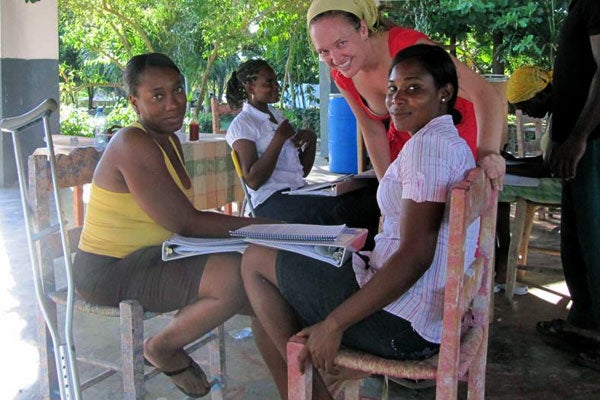
Preventing depression, infection, in tent cities
Published: March 4, 2014
New research from the University of Toronto shows that a little training can go a long way in a desperate situation.
Carmen Logie, assistant professor in the Factor-Inwentash Faculty of Social Work, demonstrated that marginalized and displaced women in Leogane, Haiti, can measurably improve mental and sexual health behaviours in their village. Her study is published online at PLOS One.
Leogane was at the epicentre of a 2010 earthquake that displaced entire populations and led to the collapse of business, social and health infrastructure throughout the country.
“By bringing women together for six educational sessions in a space for them to build connections and share their stories, public health improved significantly,” explained Logie. “Sexual health awareness and practices increased significantly and rates of depression in the community dropped 20 per cent.”
Logie visited Leogane six times between 2011-2012 training eight displaced women living in tents to become health workers. These eight health workers helped implement the program with help from 200 other displaced women.
Logie’s educational sessions took a holistic approach that addressed sexual and mental health, healthy relationships and coping with trauma.
“By the end of the program participants had increased HIV and STI knowledge, increased condom use in the community and decreased depression rates from 33 to 13 per cent,” says Logie.
Researchers faced challenges in conducting the study in post-earthquake Haiti, from participants' low rate of access to free testing and treatment for HIV or sexually transmitted infections, to low rates of literacy and unstable housing situations. Safety concerns due to lack of lighting at night meant they had to adjust the times the women's groups were held and ensure they did not walk home alone. With food insecurity also pressing concern, researchers provided snacks before every meeting; they also provided childcare for participants and permitted participants to bring babies and small children to the meetings.
The study includes a number of recommendations for future trials including: providing HIV testing and linking the study to HIV testing and treatment and including internally displaced men in HIV/STI prevention initiatives, such as male-focused and couple-focused programs.
In the meantime, Logie is planning to replicate the program in other parts of Haiti, integrating HIV testing and treatment as well as a micro-finance component to encourage citizens to build social and financial capital. She is also planning to adapt and pilot-test the program with displaced women in South Sudan.
Logie says the public needs to know about post-disaster situations and the long-lasting effect they can have on the poverty and health of survivors.
“We can empower internally displaced persons and build their capacity to be part of the solution and deliver whatever necessary help the situation calls for,” says Logie. “There are 27 million internally displaced persons around the world living in tents and tent cities so we hope we can apply this concept elsewhere.”
Michael Kennedy is a writer with University Relations at the University of Toronto.



